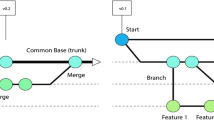Abstract
As the Internet has become widely accessible mailing list servers are being used increasingly to support collaborative discourse in scholarly communities. The majority of these communities are open and new users may join who have met few, if any, of the other list members, and come to know them primarily through email discourse. However, new members joining the discourse of an established group may have difficulty calibrating their constructs with those of the existing members, particularly since the disciplinary background of members may not be evident and may vary widely. Major misunderstandings can arise because members use the same term with different technical meanings, or use different terms for the same construct. This article provides a framework for modeling the conceptual structures of members in an Internet community and describes web-based tools that can be used by members to develop models of the social practices of other users in the community and to calibrate their own use of terminology and constructs against those of others.
Access this chapter
Tax calculation will be finalised at checkout
Purchases are for personal use only
Preview
Unable to display preview. Download preview PDF.
Similar content being viewed by others
References
Atran, S. (1990). Cognitive foundations of natural history: towards an anthropology of science. Cambridge, UK, Cambridge University Press.
Bloor, David (1983). Wittgenstein: a social theory of knowledge. New York, Columbia University Press.
Bourdieu, P., Passeron, J.-C. and Martin, M. de Saint (1994). Academic discourse: linguistic misunderstanding and professorial power. Cambridge, UK, Polity Press.
Bradshaw, J.M., Ford, K.M., Adams-Webber, J.R. and Boose, J.H. (1993). Beyond the repertory grid: new approaches to constructivist knowledge acquisition tool development. International Journal of Intelligent Systems 8(2) 287–33.
Brodkey, L. (1987). Academic writing as social practice. Philadelphia, Temple University Press.
Callon, M., Law, J. and Rip, A., Ed. (1986). Mapping the Dynamics of Science and Technology. Basingstoke, UK, MacMillan.
Flores-Mendez, R.A. (1997). Java concept maps for the learning web. Proceedings of ED-MEDIA ’97: World Conference on Educational Multimedia and Hypermedia. Charlottesville, VA, Association for the Advancement of Computing in Education.
Gaines, B.R. and Norrie, D.H. (1997). Coordinating societies of research agents—IMS experience. Integrated Computer Aided Engineering 4(3) 179–190.
Gaines, B.R. and Norrie, D.H. (1997). Coordinating societies of research agents—IMS experience. Integrated Computer Aided Engineering 4(3) 179–190.
Gaines, B.R. and Shaw, M.L.G. (1989). Comparing the conceptual systems of experts. Proceedings of the Eleventh International Joint Conference on Artificial Intelligence. pp.633–638. San Mateo, California, Morgan Kaufmann.
Gaines, B.R. and Shaw, M.L.G. (1993a). Basing knowledge acquisition tools in personal construct psychology. Knowledge Engineering Review 8(1) 49–85.
Gaines, B.R. and Shaw, M.L.G. (1993b). Eliciting knowledge and transferring it effectively to a knowledge-based systems. IEEE Transactions on Knowledge and Data Engineering 5(1) 4–14.
Gaines, B.R. and Shaw, M.L.G. (1995a). Collaboration through concept maps. Schnase, J.L. and Cunnius, E.L., Ed. Proceedings of CSCL95: Computer Support for Collaborative Learning, pp. 135–138. Mahwah, New Jersey, Lawrence Erlbaum.
Gaines, B.R. and Shaw, M.L.G. (1995b). WebMap: concept mapping on the web. World Wide Web Journal 1(1) 171–183.
Gaines, B.R. and Shaw, M.L.G. (1997). Knowledge acquisition, modeling and inference through the World Wide Web. International Journal of Human-Computer Studies 46(6) 729–759.
Gaines, B.R. and Shaw, M.L.G. (1998). Developing for web integration in Sisyphus-IV: WebGrid-II experience. Gaines, B.R. and Musen, M.A., Ed. Proceedings of Eleventh Knowledge Acquisition Workshop. pp. http://ksi.cpsc.ucalgary.ca/KAW/KAW98/gaines.
Gross, Alan G. (1990). The rhetoric of science. Cambridge, Mass., Harvard University Press.
Hull, R. and Gomez, F. (1998). Automatic acquisition of historical knowledge from encyclopedic texts. Gaines, B.R. and Musen, M.A., Ed. Proceedings of Eleventh Knowledge Acquisition Workshop. pp. http://ksi.cpsc.ucalgary.ca/KAW/KAW98/hull/.
Kelly, G.A. (1955). The Psychology of Personal Constructs. New York, Norton.
Kremer, R.A. and Gaines, B.R. (1996). Embedded interactive concept maps in web documents. Maurer, H., Ed. Proceedings of WebNet96. pp.273–280. Charlottesville, VA, Association for the Advancement of Computing in Education.
Litowski, K.C. (1997). Category development based on semantic principles. Social Sciences Computer Review 15(4) 394–409.
Phillips, Derek L. (1977). Wittgenstein and scientific knowledge: a sociological perspective. Totowa, N.J., Rowman and Littlefield.
Roberts, R.H. and Good, J.M.M., Ed. (1993). The Recovery of Rhetoric: Persuasive Discourse and Disciplinarity in the Human Sciences. Charlottesville, University of Virginia.
Selzer, Jack (1993). Understanding scientific prose. Madison, Wis., University of Wisconsin Press.
Shaw, M.L.G. (1979). Conversational heuristics for eliciting shared understanding. International Journal of Man-Machine Studies 11 621–634.
Shaw, M.L.G. (1980). On Becoming A Personal Scientist: Interactive Computer Elicita-tion of Personal Models Of The World. London, Academic Press.
Shaw, M.L.G. and Gaines, B.R. (1983). A computer aid to knowledge engineering. Proceedings of British Computer Society Conference on Expert Systems, pp.263–271. Cambridge, British Computer Society.
Shaw, M.L.G. and Gaines, B.R. (1989). A methodology for recognizing conflict, correspondence, consensus and contrast in a knowledge acquisition system. Knowledge Acquisition 1(4) 341–363.
Shaw, M.L.G. and Gaines, B.R. (1991). Supporting personal networking through computer networking. Proceedings of CHI’91: Human Factors in Computing Systems. pp. 437–438. New York, ACM Publications.
Shotter, John (1993). Conversational realities: constructing life though language. London, SAGE Publications.
Tennison, J. (1997). Linking APECKS to WebGrid-II. Department of Psychology, University of Nottingham. http://www.psychology.nottingham.ac.uk/staff/Jenifer.Tennison/APECKSAVebGrid.html.
Tennison, J. and Shadbolt, N.R. (1998). APECKS: a Tool to Support Living Ontologies. Gaines, B.R. and Musen, M.A., Ed. Proceedings of Eleventh Knowledge Acquisition Workshop. pp. http://ksi.cpsc.ucalgary.ca/KAW/KAW98/tennison/.
Wittgenstein, Ludwig (1958). Philosophical investigations. Oxford, Blackwell.
Author information
Authors and Affiliations
Editor information
Editors and Affiliations
Rights and permissions
Copyright information
© 1999 Springer Science+Business Media New York
About this paper
Cite this paper
Shaw, M.L.G., Gaines, B.R. (1999). Modeling the Social Practices of Users in Internet Communities. In: Kay, J. (eds) UM99 User Modeling. CISM International Centre for Mechanical Sciences, vol 407. Springer, Vienna. https://doi.org/10.1007/978-3-7091-2490-1_8
Download citation
DOI: https://doi.org/10.1007/978-3-7091-2490-1_8
Publisher Name: Springer, Vienna
Print ISBN: 978-3-211-83151-9
Online ISBN: 978-3-7091-2490-1
eBook Packages: Springer Book Archive




